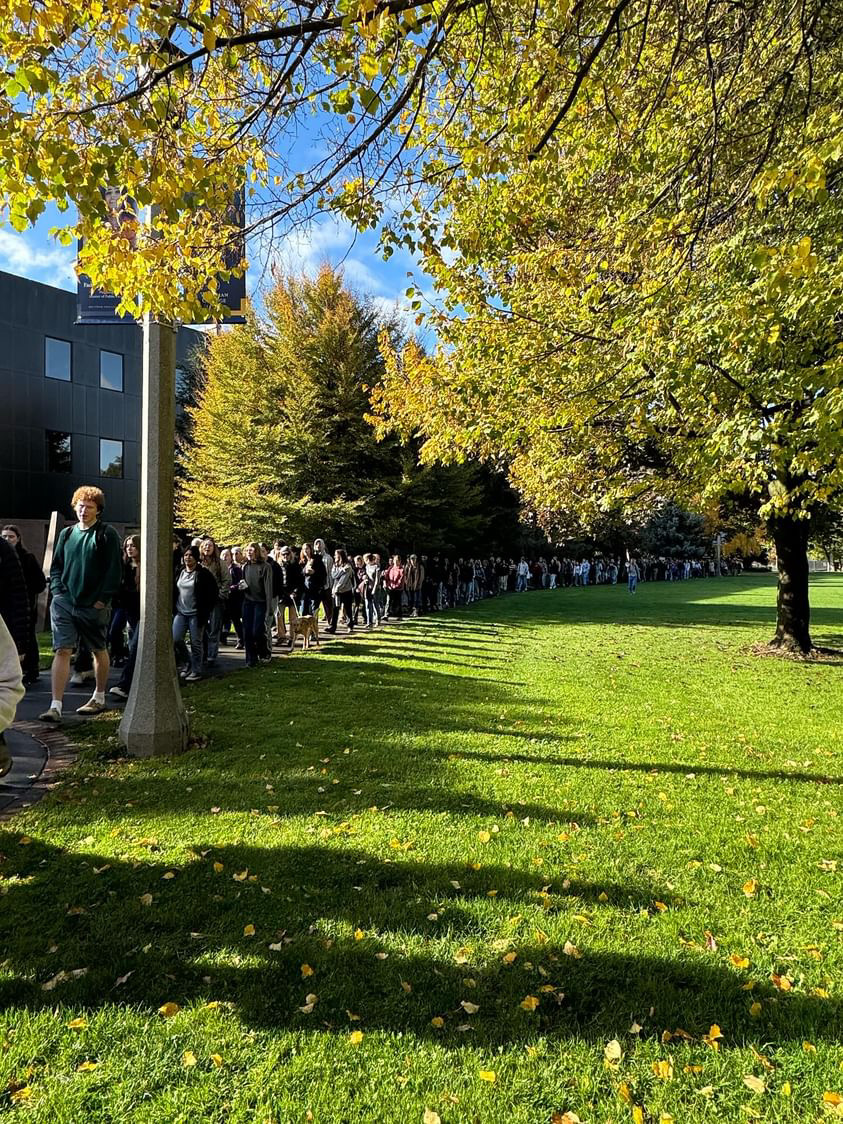I’m sitting in my apartment in Jerusalem, Israel, where I am studying abroad this semester at Hebrew University with the DOME program: Dynamics of the Middle East. I came here primarily for the academic content of my program: politics, religion, peace and conflict, etc.- to fix the knowledge gap I have about an area of importance to me personally and to the international community. Of course, the things I weren’t anticipating have been the most pleasant realizations about this city and the opportunity I have to spend five months here. Outside my window is a beautiful view of the city, and I remind myself to step outside of politics and academia for a moment to just enjoy the lights.
Although I just finished my first week at Hebrew University, I’ve been in Israel for almost a month. After finishing fall semester at Whitman without a moment to spare, I spent a week in Austin, TX with the Lawless family and then a night in L.A. before meeting my Birthright trip at LAX.
For those who don’t know, Birthright is an organization that takes Jewish young adults on a free 10-day trip all over Israel. From my understanding, the idea is to get people exposed to Israel’s history and culture, and to inspire speculation about Jewish identity and the various aspects of Israel’s existence.
My trip was a great experience. To be honest, I began my journey to Israel mostly under the sad realization that I was leaving until June. I wasn’t exactly concerned with breaking my introverted shell to meet people, and I thought of the trip mostly as a 10-day tour and a free flight.
Despite my lack of attempt to seize the fantastic opportunity that is Birthright, it affected me in significant ways. By the second half of the trip, it was more much to me than what I had originally labeled it. For the first time since my mother had moved to Jerusalem in February (2013), Israel felt like something that was personal to me as well as to her. While I had always been especially invested in the politics and history of the state, it was felt from the perspective of an outsider. My experience on Birthright, thanks to the knowledge and insight from our Rabbi and tour guides and the fact that it was a journey completely my own, gave me a connection that operates on a simply internal level.
After saying goodbye to everyone boarding for America, I got into a van that took me to my mother’s apartment in Jerusalem. After another 10 days of relaxing, going to the market, seeing movies, the Israel museum, and other such things I aggravated every train-goer in Jerusalem by shoving my bags onto the already-stuffed compartment heading towards Hebrew University. Finally, after many questions asked of strangers, sweaty and exuding aggravation of my own, we found my dorm and finally let go of my bags in my new room.
Since then, we’ve had various orientation activities/trips and have started what’s called “Ulpan”, which is basically just intensive Hebrew lessons. We learn everyday, Sunday-Thursday, from 9-2, and I’m really loving it.
The University has no classes on Friday, since Shabbat (basically Jewish day of rest) is from sundown Friday to sundown Saturday, and practically the entire city of Jerusalem closes down for those 24 hours. No public transportation, no grocery stores, etc. As one of my suite-mates (I’ll have four but two have yet to come) who’s been here since October said, it results in a sort of forced weekend. Some people of course complain about the lack of opportunity/mobility (we’re a train ride from the “city”, but there wouldn’t be much to do there anyway) on Shabbat, but I find it to be a really nice routine to set aside time to spend with family and friends, and a reason to let yourself relax after a busy week. Shabbat includes prayer and reading of the Torah, but the concept is mostly about setting aside specific time that is different from the rest of the week. We eat long meals and sit around chatting through the night and afternoon, and for a day work stops (its forbidden).
My time after Ulpan ends has been spent taking tours of the campus/city, going on an over-night hiking trip to the
desert (the Negev), going to a Shabbat dinner organized by the school, and unpacking/running errands/signing up for things/doing Hebrew homework/etc.
All to say, I’ve become even happier to be spending my semester abroad in Jerusalem: this city/country is amazingly diverse in many ways, and the sheer amount of history here is enough to spend ten years learning about. The city’s downtown is an area with great restaurants, cafes, and small shops. Jerusalem is big on cafes. One great thing about Jerusalem is that its residents try hard to keep an older feel to the city. All buildings are required to be built out of “Jerusalem stone” which is (I think) limestone, so there isn’t much “modern”-looking construction, and certainly no clump of silver skyscrapers. The whole city is comprised of different shades of tan, brown and green, which might sound unappealing but is really quite lovely and really
gives the city a visual connection to its history. There are also fewer chain stores and many individually-owned shops, although you can still
manage to find a McDonald’s (and yes, you can eat at a kosher McDonald’s). Since Jerusalem is more religious than many other cities in Israel, most of its restaurants are kosher. And then of course, there’s the Old City, which I’ll delve more into later (pictured):

So all in all, I’m enjoying myself quite a bit. I’m getting a feel for the campus (and am becoming used the insane twenty minute walk from my dorm to campus- spoiled by Whitman). The center of campus is very pretty, and has a lot of trees/plants considering we’re living in desert. I can’t wait to jump in and get involved: I’ll have an internship in the city, hopefully find
consistent volunteer opportunities, perhaps and independent study, perhaps get involved with music; I’ve found quite a few Jewish organizations on campus to look into in hopes of finding a group for holidays/Shabbat and general learning. I’m excited to take advantage of being here in order to further develop my own sense of identity regarding religion and to simply learn as much as I can about Judaism, and there are certainly plenty of opportunities to do so. Many of the organizations are also offering free meals this week, so I have no excuse to not be proactive about this. I also hope to become far more acquainted with the world’s other two major monotheistic religions, since the beautiful thing about Jerusalem is that it is almost impossible not to. While there is of course a lot of tension between different religions/ethnicities here, behind the scenes this city and country is also an example of amazing coexistence.



